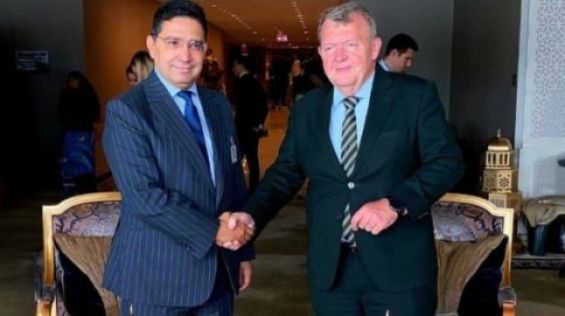Denmark has joined the list of European countries backing Morocco’s autonomy plan for the Sahara. The country has become the second Scandinavian nation to voice support for the Moroccan initiative, submitted in 2007, as a solution to the territorial conflict.
In a joint statement published on Thursday, September 26, Denmark expressed its belief that Morocco's 2007 autonomy plan is «a serious and credible contribution to the ongoing UN process and a good basis for an agreed solution between all parties».
This decision followed a meeting between Morocco’s Foreign Minister Nasser Bourita and his Danish counterpart, Lars Løkke Rasmussen, on the sidelines of the 79th session of the UN General Assembly, currently being held at the UN headquarters in New York.
In the joint statement, the two ministers reaffirmed their support for the UN-led process and for the UN Secretary-General's Personal Envoy for Western Sahara, Staffan de Mistura, and his efforts to achieve a peaceful and mutually acceptable solution to the conflict, in accordance with UN Security Council resolutions.
Alongside other regional issues, the two ministers also discussed their common ambitions to further strengthen the partnership for the mutual benefit of the economic growth and development of both countries. They agreed to enhance cooperation in trade and investment, migration, and development.
It is worth noting that in November 2023, the Polisario was counting on support from Denmark. That month, it devoted considerable media coverage to a seminar organized in the Danish Parliament on Western Sahara, titled «How to resolve the conflict before it escalates», with the participation of representatives from Denmark, Sweden, Norway, and Finland. The separatist front sent its secretary-general, Sidi Mohamed Ammar, to the event.
In March 2014, pro-Polisario Unity List Party, an eco-socialist political party in Denmark, submitted a proposal to recognize the Polisario «republic». However, the proposal, which was praised by the leaders of the separatist front, was abandoned after seven of the eight Danish parties represented in parliament opposed it.
A growing support for the autonomy plan
Denmark's new position aligns with the growing international momentum behind Morocco's sovereignty over Western Sahara and its Autonomy Plan. In August 2024, Finland, another Scandinavian country, endorsed Morocco's 2007 Autonomy Plan as a «serious and credible contribution» to the ongoing UN-led political process aimed at resolving the Western Sahara dispute.
This position was outlined in a joint communiqué issued following talks between Moroccan Foreign Minister Nasser Bourita and his Finnish counterpart, Elina Valtonen, in Helsinki. Finland also voiced support for a «just, lasting, and mutually acceptable» political solution and emphasized the exclusive role of the United Nations in the process.
Shortly before Finland, UN Security Council permanent member France officially recognized Moroccan sovereignty over the Sahara. In a message sent to King Mohammed VI, French President Emmanuel Macron stated that «the present and future of Western Sahara lie within the framework of Moroccan sovereignty».
The letter stressed that «for France, autonomy under Moroccan sovereignty is the framework within which this issue must be resolved. Our support for the autonomy plan proposed by Morocco in 2007 is clear and unwavering».
With this announcement, France became the second permanent member of the UN Security Council to recognize Morocco’s sovereignty over the Sahara, following the United States' endorsement in December 2020.
Other European countries have also voiced support for Morocco’s autonomy plan for the Sahara, including Spain. In March 2022, Prime Minister Pedro Sánchez wrote to King Mohammed VI, stating that Spain considers «the autonomy initiative presented by Morocco in 2007 as the most serious, realistic, and credible basis for settling the dispute».
In January of the same year, the President of the Federal Republic of Germany, Frank-Walter Steinmeier, sent a letter to King Mohammed VI, emphasizing that Germany «considers the autonomy plan presented in 2007 as a serious and credible effort by Morocco and a good basis for reaching an agreement» on this regional dispute.
Several European countries, including the Netherlands, Belgium, and the Czech Republic, have also supported the Moroccan proposal.




 chargement...
chargement...












